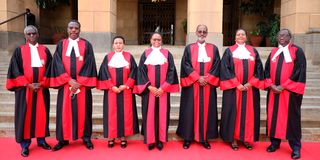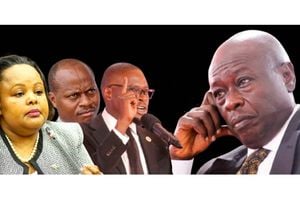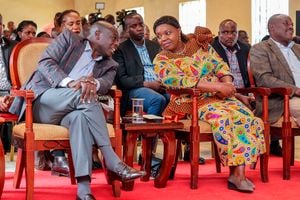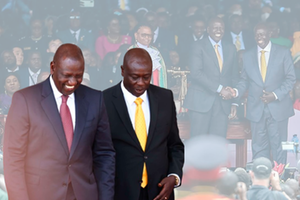Apex court strips President Ruto powers in appointing majority members of JSC

From Left: Supreme Court Judges Isaac Lenaola, Dr Smokin Wanjala, Deputy Chief Justice and Vice President of the Supreme Court Philomena Mwilu, Chief Justice and President of the Supreme Court Martha Koome, Mohamed Ibrahim, Njoki Ndung'u and William Ouko in this file photo.
The Supreme Court has stripped the President powers to appoint majority of the members of the Judicial Service Commission (JSC).
The court also ruled that it is illegal for the National Assembly to vet suitability of a person nominated by the Public Service Commission (PSC) to serve at the JSC.
According to the court, out of the 11 JSC members the President can only appoint two (one man and one woman to represent the public).
It stated that "of all the 11 members of the JSC", this is the only category in the entire Article 171 of the Constitution where approval by the National Assembly is required before appointment by the President.
He has no powers to appoint the seven members elected or nominated by their peers in professional or statutory bodies to represent them at the Commission, the court ruled.
The other commissioners, who are automatic members by virtue of their offices, are the Attorney-General and the Chief Justice.
In a judgement delivered by a divided bench of five judges, the apex court held that the President has no role in appointing persons who have been nominated or elected by their peers to serve in the JSC.
They include judges, magistrates, advocates and persons nominated by the Public Service Commission (PSC).
Additionally, the court held that the JSC members drawn from professional bodies and the PSC do not need vetting and approval of the National Assembly before assuming their roles at the Commission.
"The only instance where approval of the National Assembly is required in Section 15(1) of the Judicial Service Act, is in relation to the two members to represent the public," said the court.
A majority of four judges including Justices Mohammed Ibrahim, Smokin Wanjala, Isaac Lenaola and William Ouko declared Section 15(2) of the Judicial Service Act unconstitutional and invalid for conferring on the President the authority to appoint members elected and nominated by their peers in professional bodies to represent them at the JSC.
"We emphasize, that only under Article 171(2)(h) does the President have the mandate to nominate two persons, a man and a woman, who are not lawyers, to represent the public. That is the scope of the President’s role regarding the JSC and its membership," said the judges.
"To the extent that Section 15(2)(a) and (b) of the Act requires that the names of all the other nominees who are not representatives of the public but are elected by their peers through their professional bodies, or nominated by the PSC, to be submitted to the President for “appointment”, we find the section is ultra vires the express provisions of the Constitution," they added.
According to them, the section of the law donates to the President functions that go beyond his powers under Article 171(2)(h) of the Constitution.
They said appointment of JSC commissioners by the President can only apply and is limited to the two members representing the public.
"As a matter of fact, the only time the word “appointed” is used in the entire Article 171, is in relation to those two members. For the elected members, the appointment is concluded upon the declaration of the results of the election. The next phase of gazettement of names and the taking of the oath are only final formalities before assumption of the office," they said.
Justice Njoki Ndung'u dissented and held that the President has a constitutional duty to appoint all the JSC commissioners both under the powers conferred to him under Article 132(4) of the Constitution and by virtue of Section 15(2) of the JS Act.
According to Justice Ndung'u, there is no express exception to Article 132 of the Constitution that would exclude members of the JSC from being appointed by the President.
The judge added all Commissioners of the JSC are State officers.
Articles 171 and 172 of the Constitution, she stated, do not reveal any provisions disallowing the President from appointing elected JSC commissioners.
She explained that the appointment process of members of the Commissions listed in Chapter 15 of the Constitution is in three mandatory stages.
The stages are identification or recommendation for appointment in a manner prescribed by national legislation, approval by the National Assembly and appointment by the President.
"An appointment cannot be concluded at the first stage of identification and recommendation, without going through the second step of parliamentary approval and the third step of appointment by the President. I reiterate that to do so would be to disregard the carefully woven constitutional architectural design of separation of powers, and constitutional checks and balances between the arms of Government and the different State organs," said Justice Ndung'u.
She added that Section 15(2) of the Judicial Service Act is inconsistent with the Constitution only in as far as it directs a specific timeline in which the President appoints the JSC members.
The said section provides that the President should appoint the individuals within three days.
"This timeline, other than being extremely short and limiting, does not take into account any other necessary constitutional processes that must be carried out by the Executive and Parliament before such appointment," said Justice Ndung'u.
The judgment stemmed from an appeal filed by lobby group Katiba Institute concerning the nomination and subsequent appointment of three JSC members Patrick Gichohi, Olive Mugenda and Felix Koskei.
Mr Gichohi was appointed by former President Uhuru Kenyatta on February 9, 2018 as a representative of the PSC while Ms Mugenda and Mr Koskei were appointed as representatives of the public at the JSC.
Members of the Commission are the Chief Justice, who is also the chairperson, one Supreme Court judge elected by the judges of the Supreme Court, one Court of Appeal judge elected by the judges of the Court of Appeal and one High Court judge and one magistrate.
Others are a woman and a man elected by the members of the association of judges and magistrates, the Attorney-General and two advocates (a man and a woman elected by the members of the statutory body responsible for the professional regulation of advocates).
Other members are one person nominated by the Public Service Commission; and two members of the public (one woman and one man to represent the public not being lawyers appointed by the President with the approval of the National Assembly.
Membership to the JSC is four-pronged by virtue of office held by respective member, for example, the Chief Justice and the Attorney General; through elections by peers, namely, representatives of the Supreme Court, Court of Appeal, High Court, the Magistracy and the advocates; by nomination by the PSC, and the fourth category is through appointment by the President.




